 TRADE & INDUSTRY, THE BACKBONE OF THE NEW ECONOMY TRADE & INDUSTRY, THE BACKBONE OF THE NEW ECONOMY |
Heavy industry in Kosovo has always lagged behind that of the Former Federal Republic of Yugoslavia. Even when the possibility of developing downstream and upstream industries around its natural resources and rich mineral deposits seemed a logical, viable and recommended path for it to take.
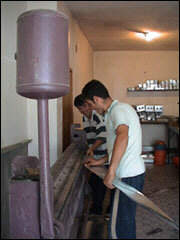
Metal artisans using rudimentary equipment
Ex-Yugoslavia's economy was structured under a regional dependency model where each federal unit would specialize in specific processes. A factory for the finalization of a particular product could be located in Croatia, while the factory manufacturing its pieces could be placed in Kosovo. This is also the case for the Trepca giant, minerals of which were used, finalized and turned into many other products manufactured throughout all of Tito´s Yugoslavia. The dissolution of the Yugoslav Federation washed away the economic links, capital resources, financial, trade, trust, social networks and in the end economic ties.
Kosovo´s industrial sector has enormous potential but very challenging tasks ahead. Aside from the seemingly unsurpassable ownership problem that remains to be solved, Kosovo´s industry also faces another main obstacle, which is the employment of up to date technology. From 243 existing industrial enterprises, that employed above 100 people, very few of them could get back in their production capacities of the pre-war times.
Most of them are waiting to be privatized in order to become productive again, while 11 have been commercialized or have been reactivated with the self-initiative of the workers and current management. For 10 years Kosovo´s industrial sector was progressively stripped away of all its assets and from debtors and opportunists. It is now in desperate need of an injection of financing and technological upgrades in order to become viable again.
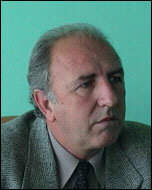
Mr. Adem Metushi, General Director of Factory of Steel, Welded and Pipes IMK.
The existing technology is generally old and dates from the period 1975 to 1980 when the economy of the former Republics of Yugoslavia were still fuelled to a great extent on Kosovo´s heavy industry and rich mineral resources. These industries cannot efficiently compete in international markets unless their capital equipment is first rehabilitated and upgraded. "This year the general plan is privatization of the business, we cannot think of investments without this transformation. With privatization we think that the next year's investments shall begin and we may start using new technology which is needed to be able to compete in the worlds market", says Mr. Adem Metushi, General Director of Factory of Steel, Welded and Pipes IMK.
Production reactivation has mainly taken place in industries related to construction material manufacturing, amongst them is the recently commercialized cement factory Sharrcem now part of the International Holcim Group. The workers of most of these industrial enterprises are however not too eagerly awaiting the privatization process to occur, even though it is the only chance they stand for reactivation.
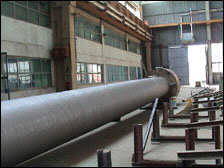
Another of the many obstacles for the regeneration of Kosovo´s industry has been the gradual loss of markets during the previous 10 years of Serbian administration. Mr. Ismet Ibishi, General Manager of the Llamkos factory is positive that this situation is changing for the better. "The difficulties are, that we have to wait for the laws of privatization to be applied. Kosovo is becoming safer every day, in that way it offers a growing number of possibilities to the investors in forms of share holdings, whether the shareholder is from Kosovo or independent. So we think that the laws of privatization would have value here even in the world trade. When we take out the existing barriers, the investor can be sure of himself and invest here".
Other similar cases are Ferronikeli and the Rubber and Chemical Factory Ballkan, whose products were just a few years ago competitive enough to have their good share of foreign markets. After two failed tenders for commercialization, Ferronikeli now leaves its rehabilitation to the process of privatization. Mr. Murat Meha, General Manager of the company points out the potential of the company and low production cost for interested foreign partners. "Expenses for extraction are very low as the ore is just below the surface, therefore exploration is done without mining or dynamite (.) the land is extremely rich in ore." There are also some enterprises like the rubber and chemical Factory Ballkan, which have reactivated production by using the initiative of its senior management and motivation of its own workers. The factory has now successfully managed to sign a few contracts with international companies and had a turnover of 10 million USD last year.
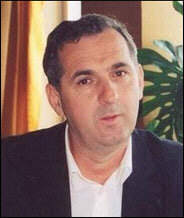
Energoinvest Managing Director, Mr. Agron Zhubi
Another prime example of an almost paralyzed
enterprise is Energoinvest,
once part of the many giants of Yugoslavia's former
industrial sector. The General Manager of Energoinvest,
Mr.
Agron Zhubi, recalls when the company had "42
offices around the world, and approximately 47000
workers". When asked about the opportunities for
investment, Mr.
Zhubi states that "local Kosovar businessmen
are informed of the potential of Energoinvest, but
for the foreign businessmen I am not sure (.) we
were isolated for more than 12 years". |
Most enterprises have attained a minimal level of production activity like Fabrikae Amortizatoreve Prishtina who currently produces suspension devices for the local market. During the pre-war Kosovo this SOE lost its main customer, France's car manufacturer Peugeot. At the time Fabrikae Amortizatoreve´s yearly capacity was 4 million units, though it never produced more than 3.3 million units a year at its peak production. Fabrikae Amortizatoreve is now looking to reactivate production in order to regain a presence in foreign markets. Mr. Gani Dauti, the General Manager says that he is now ready to work with international companies even though conditions over the last three years have been difficult. Not withstanding that, "in these conditions we managed to sign three contracts with foreign partners, American "Jepa" Ltd., the second being "Austrotech" from Austria with which we established an institute for the management and engineering of enterprises, and the third contract was with a company called "IAG" which is also an Austrian company for the production of pallets. From these partners we were presented to Mercedes, Magna and Saab, as a reliable company that can produce special pallets for the automobile industry, this was our first test and it seems like we have passed it well".
These Socially Owned Enterprises are all in desperate need of investments, markets and immediate restructuring. The potential that these companies may have to become a success is undoubtedly totally undermined by the overwhelming barriers; ownership issues, outdated equipment, lack of expertise and proper management skills, which put Kosovo´s industry at a considerable disadvantage. These conditions further deter the influx of FDI. However, Kosovar management remains optimistic. "For our potential partners my message is simple, just have confidence in Kosovo´s businessmen. Be assured that the war ended and now the people of Kosovo are thirsty for business and moving forward. We are all waiting for cooperation in business. Kosovo has big potential, flexible people and is gifted with a qualified young labor force and technical workers. In addition, it also has natural resources plus being located in the central Balkans makes it ideal as a hub for the transportation and distribution of goods", says Mr. Adem Metushi, General Director of IMK.
Trade has been the main pillar supporting most Kosovars over the last 10 years. The sector has continued to play a predominant role within the economy even after the war. Being expelled from their jobs, most Kosovars found alternative ways of subsistence in trade. The lack of investments resulting in dwindling numbers of new job opportunities, made trade an easy and feasible way of obtaining extra earnings. The Statistical Agency of Kosovo estimates that at least one in three persons in Kosovo has been or is involved in some kind of trading activity. Surveys conducted on the number of businesses in the region and the nature of their activities by both the Central Fiscal Authority of Kosovo and Statistical Agency of Kosovo are consistent in suggesting that most trade companies are involved in importation, whole sale and retailing.
Up until 1998 the most representative companies in the sector were EXIMKOS for foreign trading, "Farmed" for pharmaceutical supplies and "Kosova Petrol" for petroleum imports. Much smaller companies who specialized in the importation retail and distribution of niche products today characterize Kosovo´s trade sector. One such company is Xheni-Commerce, engaged in the importation and distribution of roof tiles or Canadian tiles as they are called in the local market. Mr. Xhelat Ajeti, owner and Director of Xheni-Commerce describes his company as " exclusive representatives that bring new products to the Kosovar markets, products that have been proven successful in sophisticated markets such as Austria, Germany, Switzerland, the USA and Canada. Many companies have been empowered economically and they are now running to different parts of the world, where goods are produced in order to get the exclusive right for importation and distribution of those goods in Kosovo. Not many world known companies have direct representative offices in the region, and have alternatively chosen one or two tradesman for representing their products.
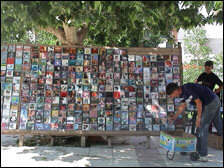
Pirate CD´s flood the streets of Pristina
The Central Fiscal Authority of Kosovo has estimated that imports in the region for the year 2001 were in the value of 2.1 billion Euros, while in year 2000 estimates were 1.9 billion Euros. Imports into Kosovo in the year 2001 increased by 6.7% in comparison to the previous year. From this amount, only goods to the value of 539 000, 000 Euros paid fiscal and customs duties. Kosovo´s main trading partners are countries within the Balkan region and in the European continent. The EU supplies about 35% of all of Kosovo´s imports, 28% are from Macedonia, Turkey accounts for another 12%, Montenegro 10%, Serbia 8% and Albania another 4%. These figures only correspond to the registered imported goods.
Most import goods originating in Serbia or Montenegro are not really obliged to submit the legal customs duties imposed by UNMIK and the current legislation. No institution can accurately produce figures on the amount of exports of Kosovar enterprises to foreign markets. The lack of evidence on export figures has to be placed on institutions like UNMIK´s Central Fiscal Authority and the Customs Service of Kosovo. These entities claim that export figures are so small that they are not relevant in statistical terms. Nevertheless, the Statistical Agency of Kosovo estimates with a reasonable degree of certainty that from the approximate 50,000 registered businesses in the territory, 60% are engaged in either import or export trading activities. Anyone with a small amount of capital can find a market for importing something. No previous qualification is requested. Also in very sensitive sectors like import of petrochemicals and cigarettes, there is no import limitation, which has prompted many to seek the easy rewards this loophole posseses.
There is no official information on the amount of goods flowing through border points with Serbia and Montenegro. The uncontrollable trade of diesel, petroleum, and other oil based products and the millions of illegally smuggled cigarettes are prime examples that verify the lack of regulation and control that the authorities and administrators of Kosovo have over the sector. In a territory with 2,200,000 inhabitants and 10,000 square meters of land, there are more than 2000 petrol stations and more than 300 different importers and retailers of gasoline and bi-products. UNMIK and local officials have attempted to remedy unfair competition and there have been improvements made but the situation is far from resolved. It is obvious that there is a great amount of goods being smuggled, mainly from Serbia and Montenegro. Customs offices in locations such as Hani I Elezit, a border point with Macedonia and the customs office of Morina, in the border point with Albania, have significantly higher revenues than those located in the border points with Serbia and Montenegro. These problems are also related to the status question. Un-officially UNMIK looks the other way in regards to Taxation in the importation of products from former Republics, and also to encourage ties and economic dependency from both parties. |

